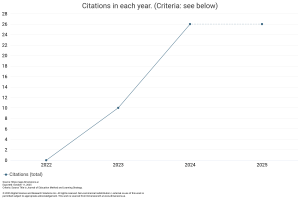Implementation of Interactive Science Module Based on Problem Based Learning to Increase Activeness Study
DOI:
https://doi.org/10.59653/jemls.v3i02.1751Keywords:
Implementation, interactive modules, Problem Based Learning, student learning activityAbstract
This study aims to determine the effectiveness of the implementation of interactive modules of Science based on Problem Based Learning (PBL) in improving the learning activity and achievement of fourth-grade students of SDN 09 Bungku. The research methods used were observation, interviews, and evaluation of student learning outcomes before and after implementing the module. The results showed that the implementation of interactive modules based on PBL significantly improved student learning activity. Students became more enthusiastic, actively discussed, asked questions, and solved problems independently or in groups. In addition, student learning achievement also experienced a significant increase, with all students achieving the Minimum Completion Criteria (KKM). This interactive module provides an enjoyable and meaningful learning experience by presenting contextual materials, visual illustrations, and interactive activities that stimulate critical thinking and student creativity. The teacher acts as a facilitator who guides students in using the module to make the learning process more effective and structured. This study recommends the use of interactive modules based on PBL as an alternative innovative learning that can improve motivation, involvement, and student learning outcomes in elementary schools.
Downloads
References
Asmaliyah, Fifin, Ni Made Intan Keriyani, and Slamet Nugroho. 2025. “Improving Motivation and Learning Outcomes Students Through Implementation of Problem Based Learning Model with Culturally Responsive Teaching Approach in Learning Mathematics.” Journal Scientific Education Professions 10(1):840–50. doi:10.29303/ jipp.v 10i1.3136.
Azwah, Nur, Rahmat Hidayat, and Lutfi Qurratul Aini. 2025. “Improving Learning Outcomes Student Through the Problem-Based Learning Model Gamification in Indonesian Language Subjects at SMPN 15 Mataram.”
Divia Rahmadini and Muhammadi. 2025. “Development of Articulate Storyline 3-Based Media with the Problem-Based Learning Model in Pancasila Education for Fourth Grade Elementary School Students.” Journal of Practice Learning and Educational Development 5(2):640–48. doi:10.58737/ jpled.v 5i2.484.
Dwiyanti, Risna, and Muh Rizal. nd “APPLICATION OF PROBLEM-BASED LEARNING MODEL WITH DIFFERENTIATED LEARNING STRATEGY TO IMPROVE LEARNING OUTCOMES OF FLAT-SIDED SPHERICAL FIGURES IN CLASS VIII MTs.N 4 KOTA PALU.”
Fadilah, Muhyiatul, Helendra Helendra, Heffi Alberida, Rahmawati Rahmawati, Elifia Zulfa Endela, Syafira Defni, and Putri Reuni. 2025. “ Modeling Problem Based Learning Based Learning Issue Disaster For Biology and Science Teachers in Silokek Village, Sijunjung Regency.” Abdi: Journal Community Service and Empowerment 7(1):302–9. doi:10.24036/ abdi.v 7i1.713.
Masyuha, Hardianti Darwa. nd “APPLICATION OF EDUCATIONAL GAME-BASED LEARNING MEDIA ‘BERANG’ IN POETRY LEARNING AT STATE VOCATIONAL HIGH SCHOOL 2 GOWA.”
Moonik, Melisa Paulina, Anatje Lihiang, and Christny FE Rompas. 2025. “Problem-Based Learning Model: Implementation in Learning Biology of Movement System Material.” 3.
English: Journal of Character and Elementary Education.
Muhammad Nawir, Aini Nurpratiwi, and Dimas Mulyadin. 2025. “Improving Social Studies Learning Outcomes through Implementation Quiz Interactive Based on Technology Student Class 8 SMPN 1 Barru.” SOCIAL: Journal Social Science Education 3(1):31–38. doi:10.62383/ sosial.v 3i1.580.
Nabila, Fasya Nuri, Venissa Dian Mawarsari, and Eko Andy Purnomo. 2025. “Implementation of E- module Based on Project, Activity, Cooperative, Exercise (PACE) Nuansa Kota Lama Semarang Material on Flat-Sided Space Building for Grade VIII of Junior High School. “.. June 6.
Pratama, Amalia Dita, and Firda Dyah Alvin Hasanah. 2025. “IMPROVING MATHEMATICAL COMMUNICATION WITH PBL ASSISTED BY MATCHA MATH CARD ON QUADRATIFICAL FUNCTION MATERIAL OF STUDENTS OF 10TH GRADE HIGH SCHOOL.” 5(2).
Putri, Annisa, Iin Hindun, and Sri Suharni. 2025. “Implementation Contextual Teaching and Learning Approach for Increase “Activity and Learning Outcomes of Pancasila Education in Grade II Elementary School.”
Princess Marfhadella, Nurwanti Fatnah, and Adiyanti. 2025. “Implementation of Learning Media Interactive Based on Educatplay For Improving Learning Outcomes Grade IX Students of SMPmp Negeri 02 Sources on the Material of Chemical Reactions and Their Dynamics.” NUSRA: Journal Research and Education Science 6(2):385–97. doi:10.55681/ nusra.v 6i2.3734.
Savitri, Nanda Aulia, Muhammad Afandi, and Yulina Ismiyanti. 2025. “ANALYSIS OF ACTIVITY IN THE APPLICATION OF MULTIMODAL LEARNING MEDIA IN THE SCIENCE SUBJECT ON MAGNET MATERIAL IN CLASS IV B OF SULTAN AGUNG 02 ISLAMIC ELEMENTARY SCHOOL SEMARANG.” 5(2).
Tritjahjo Danny Soesilo, Yustinus Windrawanto, Firosalia Kristin, Aurellia Jeslyn, and Adi Nurhidayat. 2025. “Implementation of Problem Based Learning Model and Use of Career Racing Board Game in Improving Career Maturity of Students: Implementation of Problem Based Learning Model and Use of Career Racing Board Game in Improving “Students’ Career Maturity.” Scholaria: Journal of Education and Culture 15(1):93–100. doi:10.24246/j.js.2025.v15.i1.p93-100.
Widayanti, Anis, Annisa Yuniar Hidayah, Elsy Alifia Pratiwi, Singgih Bektiarso, and Kuntari Dwi Meitikosari. 2025. “IMPLEMENTATION OF CULTURALLY RESPONSIVE TEACHING(CRT) APPROACH USING DREAM MARKET DEMONSTRATION TOOLS TO IMPROVE STUDENTS’ LEARNING OUTCOMES IN THE SUBJECT OF SCIENCES IN GRADE IV ELEMENTARY SCHOOL.” 10.
Yulizah, Yeny, Sulistiyono Sulistiyono, and Zico Fakhrur Rozi. 2025. “ Analysis The Need for Acid-Base Chemistry Modules Based on Project Based Learning (PjBL) at SMA Negeri 1, Lubuklinggau City.” JagoMIPA: Journal of Mathematics and Science Education 5(2):402–11. doi:10.53299/ jagomipa.v 5i2.1514.
Downloads
Published
How to Cite
Issue
Section
License
Copyright (c) 2025 Rufia, Misnah, Bau Ratu

This work is licensed under a Creative Commons Attribution-ShareAlike 4.0 International License.
Authors who publish with this journal agree to the following terms:
- Authors retain copyright and grant the journal right of first publication with the work simultaneously licensed under a Creative Commons Attribution-ShareAlike that allows others to share the work with an acknowledgement of the work's authorship and initial publication in this journal.
- Authors are able to enter into separate, additional contractual arrangements for the non-exclusive distribution of the journal's published version of the work (e.g., post it to an institutional repository or publish it in a book), with an acknowledgement of its initial publication in this journal.
- Authors are permitted and encouraged to post their work online (e.g., in institutional repositories or on their website) prior to and during the submission process, as it can lead to productive exchanges, as well as earlier and greater citation of published work (See The Effect of Open Access).
























